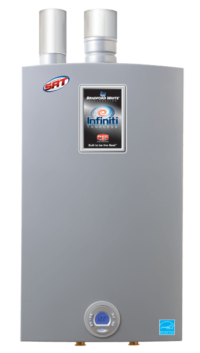Table of Contents
Despite the overall warmer weather in Greenwood and Indianapolis, hot showers are still part of routine during colder months of the year. So, when you’re not getting enough hot water, it’s usually an indication of a problem with your water heater.
Conventional water heaters with tanks have the longevity of around 10 to 12 years. Once you cross the 12-year mark, it’s time to get a replacement. You may notice that your water heater is past its prime if you’re getting rusty water or seeing a water leak around the heater.
Similarly, inefficient heating is also a sign that it’s time for you to get a new heater. If you relied on a conventional tank water heater up until now, it may be time to finally go tankless.
What is a Tankless Water Heater?
Also referred to as on-demand water heaters, tankless versions are replacing conventional models in most homes. It includes a small insulated ‘tank’ that holds around 50 gallons of water that’s heated and stored until required.
How Does It Work?
It relies on quick and efficient heaters to heat water rapidly while it runs through an exchanger. Then, hot water is delivered straight to showers and faucets without being stored in a tank first.
Why Going Tankless is the Right Choice
Let’s see how tankless heaters compare to conventional models, making it a better choice for a replacement.
Energy Efficiency
Your tankless water heater can run on electricity or gas, and will still be more energy efficient than traditional gas-powered water heaters that rely on tanks. Consumer Reports’ tests show that the energy efficiency difference is approximately 22%.
If your home uses less than 40 gallons of hot water on a daily basis, you can enjoy up to 34 percent of greater energy efficiency than a storage tank heater. Even if you use double the amount, over 80 gallons, you’ll still enjoy around 14% of additional energy efficiency.
Better Longevity
Unlike your basic tank water heater, a tankless version, whether electric or gas-powered, can last up to 20 years. Since there’s no storage tank involved, a tankless heater experiences less wear and tear.

Space Consumption
Tankless water heaters generally take up less space as compared to versions that come with a storage tank. However, it ultimately depends on whether you opt for a gas or electric-powered water heater. Gas-powered tankless heaters will require more space as compared to their electric-powered counterparts.
How Much Does It Cost To Get A Tankless Water Heater In Greenwood Or Indianapolis?
The overall cost of installing a tankless water heater depends on a variety of factors, like if it’s a single point heater or whole house water heater, and if it’s powered with electricity or gas. Then, you also need to consider the brand of heater you’ll be installing, labor, and if you need to replace any pipes.
But when compared to traditional water heaters with storage tanks, tankless models cost more for initial installation due to their strategic design.
The average cost is around $2,000 but can range between $1,000 and $2,900. Tankless water heater models vary on the basis of brand and flow rate.
Installation and Piping
Once you determine the brand of water heater to get, the next influential cost to consider is installation. If you choose to hire a professional i.e. a licensed plumber, you can expect to pay an hourly rate of around $50 to $150. Since installation takes around three hours, your final cost for installation will be around $150 to $450.
You’ll also need to calculate how much material you need for important components. Typically, you’ll require a termination vent kit, lead-free brass valve set, gas connector kit, and mounting hardware with fittings.
Removing and disposing of your current heating system is part of the process, so add an extra margin in your budget to accommodate additional costs.
Gas or Electric
Natural gas or propane-powered tankless water heaters cost an average of around $1,500 to install and have a higher starting range than electric ones. On the other hand, electric models have a lower starting range of $800, but it can go higher as well.
Electric versions need less complicated labor work since vents aren’t necessary, and they’re more convenient to maintain. However, you’ll need more electricity to power a tankless water heater as compared to gas, so calling in an electrician to rewire your home for a heater will add to the total cost.
If your home has higher water demand, it’s a better option to consider installing a gas-powered tankless water heater instead of an electric one.
Does It Require Professional Installation Services?
Common questions that come to mind when considering a replacement or home improvement expense is if you can do it yourself or if you need professional help. To put it bluntly, this isn’t the kind of project the average home DIY enthusiast can handle.
Your home needs to be compliant with new changes to accommodate a system. Therefore, you will require new gas lines or rewiring, and even some fittings along with new piping. To top it all off, add drywall reconstruction to the list if you want to preserve your home’s outer appearance.

In some localities, only trained professionals can complete the process since there are compliance codes for aspects like venting, thermal resistance, and carbon monoxide emissions.
To make sure your home’s water heater system meets all the permit and coding requirements, you should hire a professional. With their experience, you don’t have to guess if you’re getting the right equipment and hardware for your home.
This Isn’t a DIY Project – Call a Licensed Plumber
Opting for a licensed plumber to install your tankless water heater guarantees better performance and code compliance according to state regulations.
Here at Carter’s, your local Indianapolis Plumbers, you can get guaranteed installation services at affordable rates. Don’t settle for less, settle for the best. Schedule an appointment by giving us a call at (317) 859-9999.





